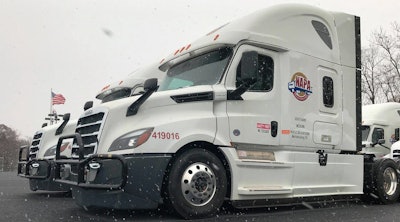
CCJ Innovators profiles carriers and fleets that have found innovative ways to overcome trucking’s challenges. If you know a carrier that has displayed innovation, contact CCJ Chief Editor Jason Cannon at [email protected] or 800-633-5953.
Truckers hate sitting still because when the truck isn’t rolling, in most cases, they’re not making money.
One carrier used this adage to change driver behavior and alleviate back-office staff.
Mechanicsburg, Pennsylvania-based truckload carrier NAPA Transportation (CCJ Top 250, No. 178) saw an almost overnight shift in logbook compliance with a simple change in its driver app. The carrier, which serves the Northeast, Mid-Atlantic, Southeast and Midwest regions, decided to remove the load card that provides trip details if a driver had not verified their logbook.
NAPA IT Director Jim Brighton said this project happened by accident “as often good projects generally do.”
The carrier was dealing with staffing shortages in its safety department amid the COVID-19 pandemic, and the problem with unverified logs was so bad that one of those staff members was devoted to following up with drivers to bring them into compliance.
Up to 75% of drivers were regularly not verifying their logbooks after each shift.
“It doesn't matter how much you train drivers, they'll find shortcuts,” Brighton said. “So one of the things we talked about is how to prevent a driver from starting the trip if they're not in compliance.”
Changing habits to solve an industry problem
Mismanagement of drive time is an industry-wide concern. Hours of service violations were the top reason drivers were placed out of service during CVSA's Roadcheck blitz earlier this year, and with an OOS rate of 32.1%, hours of service accounted for the highest percentage among all violations. Inspectors restricted 870 drivers from further travel due to hours-of-service violations this past May.
Brighton’s team determined the best method was to prevent drivers from moving on to their next load, effectively shutting them down, until they verified their logbook. To do that, the company pulls data related to logbook compliance from its telematics provider Geotab via API back to its Trimble transportation management system to identify drivers who are out of compliance. In its customizable driver app, powered by Eleos, the company has the functionality to perform “if this, then that” scenarios. The company tells the app to remove a driver’s load card from the display if their TMS flags that driver for having not verified their logbook within the past 48 hours.
If the driver is in compliance, they have a load card on their display with a start button that takes them to trip details like navigation. If they aren’t in compliance, the app prompts them with a link that immediately takes them to verify their logbook.
Within five minutes of verifying their logbook, the load card becomes available so they can continue about their business and with implementation of the plan, driver log compliance went from 25% to more than 93%.
“It changed a habit, and drivers haven't really complained about it because they know that's work they need to do,” Brighton said. “I would say it's reached, nothing's ever 100%, but it's about as close to 100% as you can get. We don't have somebody devoted to reaching our drivers to check compliance now.”
Log verification is key to upholding a good Compliance, Safety & Accountability (CSA) score, which affects things like insurance premiums to the charge-out rate a fleet can command.
Brighton said it’s difficult to quantify the benefit this simple change in the driver app has had on the company, but it has improved compliance, reducing the risk of non-compliance-related fines and penalties, and it has freed up safety personnel to focus on more productive work.
“I think internally, it's at least helped us to see that we can do things on our mobile app that helps the office side of our business, versus just it being a driver-focused app,” he said. “And it has brought new ways of thinking.”
Brighton said NAPA is now considering doing something similar with Driver Vehicle Inspection Reports because the carrier is struggling to get drivers to perform them. Instead of removing the load card, the load card may prompt them to complete a pre-trip DVIR before the “start” button will appear.
The CCJ Innovators program is sponsored by Comdata, ExxonMobil, Fleetworthy and Mack Trucks.












